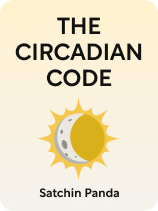

This article is an excerpt from the Shortform book guide to "The Circadian Code" by Satchin Panda. Shortform has the world's best summaries and analyses of books you should be reading.
Like this article? Sign up for a free trial here.
Do you have unexplained health or sleep problems? Could your daily habits be disrupting your body’s natural rhythm?
The Circadian Code, Satchin Panda warns that the effects of circadian rhythm disruption can be far-reaching and detrimental to your health. From sleep disorders to mental health issues, an off-kilter internal clock can wreak havoc on your well-being.
Read on to learn about the causes and effects of circadian rhythm disruption.
Effects of Circadian Rhythm Disruption
Panda explains that your circadian rhythm is the internal 24-hour schedule that guides your body through the daily tasks needed to keep you healthy. This schedule, also called your internal clock, controls almost every aspect of your health and functioning, such as when to sleep, digest foods, and produce different hormones. Your body can’t accomplish all of its needs at once, so it must perform different functions during different times of the day. Panda identifies the effects of circadian rhythm disruption and explains that many common lifestyle habits cause this disruption.
(Shortform note: While most animals follow a roughly 24-hour cycle like humans, some animals can be active around the clock without any negative effects on their sleep, digestion, and hormone production. You can see this in animals like reindeer in the Arctic, migratory birds, and social insects like bees and ants. These animals show flexibility in their circadian systems, allowing them to adapt their activity patterns to their unique needs and environments.)
Panda writes that disrupting your circadian rhythm can have many negative consequences for your health. It can increase the risk of various health issues, such as gastrointestinal disorders, obesity, diabetes, and cardiovascular problems. An unhealthy circadian rhythm can also lead to mental illnesses like depression and anxiety.
(Shortform note: The vast majority of people in the US are likely experiencing some level of circadian rhythm disruption in their daily lives. The public health implications are staggering when you consider that approximately 16% of US adults regularly work at night, around 70% work indoors with limited natural light exposure, and an estimated 99% are affected by light pollution that brightens the night sky. Also, the twice-yearly time changes for daylight saving time affect millions of Americans, causing health and safety issues like increased heart attacks, strokes, and traffic accidents.)
Panda warns that, because a disrupted circadian rhythm can significantly harm your health, you must maintain a healthy rhythm by living in accordance with your clock.
Causes of Circadian Rhythm Disruption
Panda argues that many modern lifestyle habits clash with our bodies’ natural circadian rhythms. Humans evolved to eat and work during the day and sleep at night, and this is the daily pattern that our bodies function best on. However, the discovery of fire allowed humans to defy their internal clocks by staying awake when it’s nighttime. Today, with technology and cheap electricity, we regularly disrupt our circadian rhythms.
Panda identifies four modern habits that disrupt your circadian rhythm:
- Eating at any hour of the day or night
- Going to bed late, sleeping in, and not getting enough sleep
- Not getting light exposure at the right times
- Not getting enough exercise
(Shortform note: In The Comfort Crisis, Michael Easter discusses additional ways that our modern habits go against our evolutionary design. Specifically, these habits make our lives too comfortable, which isn’t healthy for us. He explains that our bodies and minds evolved to respond to stressors, such as hunger and cold. These stressors, in moderation, kept our ancestors healthy, but are now largely absent from our daily lives. For example, we no longer need to exercise to get food, rarely experience hunger, and spend little time in nature. As a result, we now face widespread chronic physical and mental health issues that were extremely rare just a century ago.)

———End of Preview———
Like what you just read? Read the rest of the world's best book summary and analysis of Satchin Panda's "The Circadian Code" at Shortform.
Here's what you'll find in our full The Circadian Code summary:
- The modern habits that disrupt your circadian rhythm
- How your internal 24-hour schedule works
- The little habits that will recharge your battery






